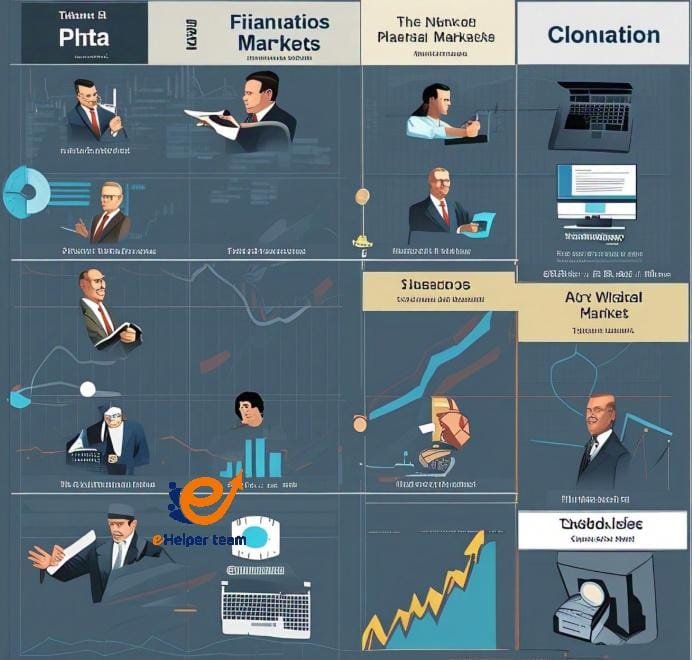The Evolution of Financial Markets: Stocks, Trading, and Cryptocurrency
Financial markets have undergone a remarkable transformation over the past century. From traditional stock trading to the emergence of digital assets like cryptocurrencies, investors now have an array of opportunities to grow their wealth. Understanding how different asset classes work and their potential risks and rewards are crucial for any investor, especially in today’s rapidly evolving economic landscape.
Understanding the Stock Market
What is a Stock Market?
The stock market is a centralized marketplace where investors buy and sell shares of publicly traded companies. It serves as an essential component of the global economy, allowing businesses to raise capital and investors to gain ownership in companies.
How Stocks Work
When an investor purchases stocks, they essentially buy a small portion of a company. Stocks can be classified into two main types:
- Common Stocks: Provide voting rights and dividends but come with higher risks.
- Preferred Stocks: Offer fixed dividends with limited or no voting rights but are generally considered less volatile.

Benefits and Risks of Investing in Stocks
Benefits:
- Long-term Growth: Historically, stocks have provided substantial returns over extended periods.
- Dividend Income: Many companies distribute a portion of their profits to shareholders.
- Liquidity: Stocks can be easily bought and sold in regulated markets.
Risks:
- Market Volatility: Prices fluctuate due to economic and political changes.
- Company Performance: Poor earnings reports can negatively impact stock prices.
- Economic Conditions: Inflation, interest rates, and global events can affect stock value.
Explore more about Stock
The Fundamentals of Trading
What is Trading?
Trading refers to the buying and selling of financial instruments, including stocks, commodities, currencies, and cryptocurrencies. Unlike long-term investing, trading focuses on short-term price movements.
Types of Trading
- Day Trading – Buying and selling assets within the same trading day.
- Swing Trading – Holding positions for several days to capitalize on short-term trends.
- Scalping – Making multiple small trades throughout the day to profit from minor price fluctuations.
- Position Trading – Long-term strategy where traders hold assets for weeks or months based on fundamental analysis.
Key Factors for Successful Trading
- Market Analysis: Understanding technical indicators and fundamental data.
- Risk Management: Setting stop-loss orders to minimize potential losses.
- Trading Psychology: Maintaining discipline and avoiding emotional decisions.
Cryptocurrency: A New Financial Frontier
Introduction to Cryptocurrencies
Cryptocurrency is a digital or virtual form of currency that uses cryptographic techniques to secure transactions. Unlike traditional currencies, cryptocurrencies operate on decentralized networks, often powered by blockchain technology.
Popular Cryptocurrencies
- Bitcoin (BTC) – The first and most well-known cryptocurrency.
- Ethereum (ETH) – Known for its smart contract capabilities.
- Ripple (XRP) – Focuses on cross-border transactions.
- Litecoin (LTC) – A faster alternative to Bitcoin.
Advantages of Cryptocurrency
- Decentralization: No government or central authority controls it.
- Transparency: Blockchain records transactions publicly and immutably.
- Lower Transaction Fees: Compared to traditional financial institutions.
- Accessibility: Available to anyone with an internet connection.
Risks Associated with Cryptocurrency
- Volatility: Prices can change dramatically in short periods.
- Security Concerns: Risk of hacking and fraud.
- Regulatory Uncertainty: Governments worldwide are still formulating policies around digital assets.
Discover more about TokenDigest Crypto
Stocks vs. Cryptocurrency: A Comparative Analysis
| Feature | Stocks | Cryptocurrency |
|---|---|---|
| Market Age | Centuries-old | A little over a decade |
| Regulation | Highly regulated | Partially regulated |
| Volatility | Moderate | High |
| Accessibility | Requires brokerage account | Easily accessible via digital wallets |
| Ownership Type | Company shares | Digital assets |
The Future of Financial Markets
As technology advances, the lines between traditional markets and digital assets continue to blur. Financial institutions are increasingly adopting blockchain technology, and investors are diversifying their portfolios by including both stocks and cryptocurrencies.
Key Trends to Watch
- Institutional Adoption of Cryptocurrency – Major companies and banks are exploring crypto investments.
- Stock Market Innovations – AI and algorithmic trading are revolutionizing stock exchanges.
- Regulatory Developments – Governments are implementing policies to oversee digital asset markets.
Conclusion
Investors today have more options than ever before. Whether you prefer the traditional security of stocks, the fast-paced world of trading, or the innovative realm of cryptocurrency, understanding these financial instruments is essential for making informed decisions. Staying updated with market trends, conducting thorough research, and managing risk effectively will help investors navigate the ever-changing financial landscape.





